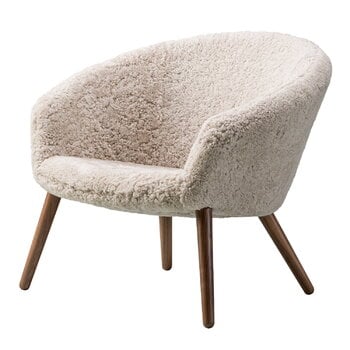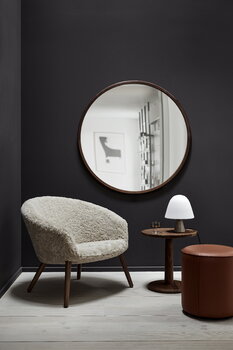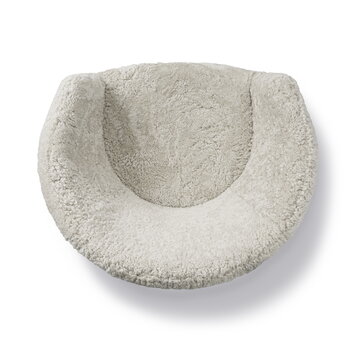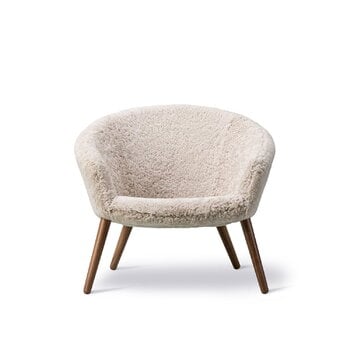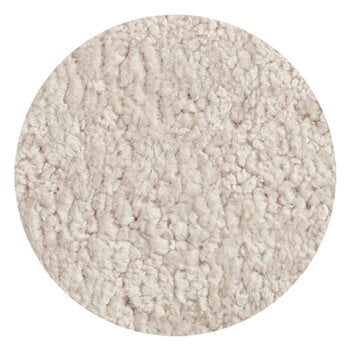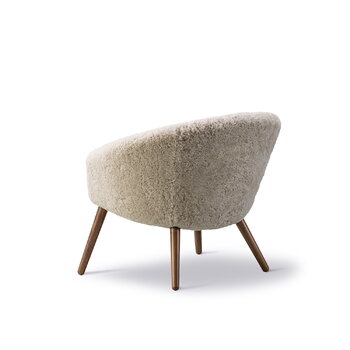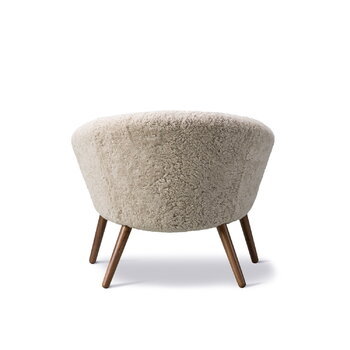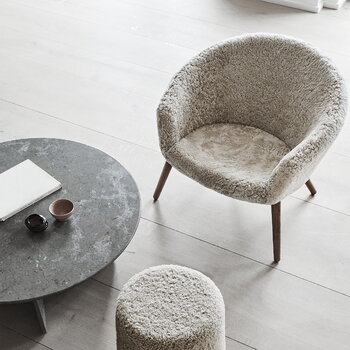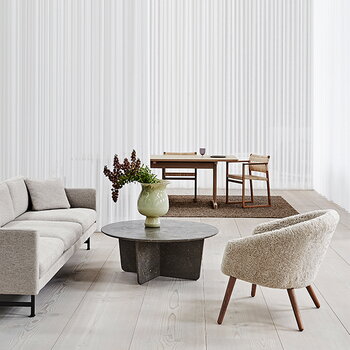Fredericia’s Ditzel armchair, as the name suggests, is a beautiful and inviting seat designed by Nanna and Jørgen Ditzel in 1953. The designer couple aimed to create a comfortable and practical armchair that would look good from all directions – this way the chair could be used in any space and anywhere in that space. The understated elegance of the Ditzel armchair is suitable for a wide range of milieus, from private living rooms and reading corners to cafés and hotel lobbies.
Ditzel lounge chair, Moonlight sheepskin - walnut
Fredericia
Description
Fredericia’s Ditzel armchair, as the name suggests, is a beautiful and inviting seat designed by Nanna and Jørgen Ditzel in 1953. The designer couple aimed to create a comfortable and practical armchair that would look good from all directions – this way the chair could be used in any space and anywhere in that space. The understated elegance of the Ditzel armchair is suitable for a wide range of milieus, from private living rooms and reading corners to cafés and hotel lobbies.
Product details (9)
- Colour
- Light beige, walnut
- Width
- 81 cm
- Depth
- 73 cm
- Height
- 72 cm
- Seat height
- 37 cm
- Upholstery fabric
- Scandilock Moonlight Curly 17 mm: Australian sheepskin with curly character and high density. The skin is naturally curly but the structure of the wool can vary both with regard to the curls and the colour tones.
- Base material
- Lacquered walnut
- Weight
- 14 kg
- Warranty
- 7 years
- Product ID
Designer
Nanna & Jørgen Ditzel were a Danish designer couple whose most famous design is the Hanging Egg chair from 1959. Ditzel’s organic designs and innovative use of materials gained popularity in the 1950s, and their jewelry line was awarded with gold medal in Milan’s Triennale in 1954 and with the Lunning Prize in 1956. After her husband’s death in 1961, Nanna Ditzel continued her successful career as a designer until her death in 2005.
View all productsReviews (1)
5
Based on 1 reviews
-
M
Margreeth P
Tilburg, Netherlands
beautiful !
277 days ago
Sustainability
The Product Sustainability Framework, our criteria of sustainable design, helps you find the most sustainable products in our selection. Read below which sustainability criteria this product has met.
Working conditions & labour 7/9
-
Equal opportunities for all employees
-
Commitment to UN Global Compact, fair compensation for all employees
-
Corporate responsibility requirements defined and communicated for suppliers
-
Systematic work for improved inclusion and well-being in the workplace
-
Transparent supply chain
-
Suppliers' compliance to a code of conduct ensured
-
Support for community involvement in the supply chain
-
Direct suppliers audited and certified
-
Compliance to the UN Guiding Principles on Business and Human Rights ensured in the supply chain
Eco-friendly production 6/9
-
Fair and resource-wise water-use in production
-
No incineration or landfilling of returned items
-
No use of endangered species as materials
-
No direct environmental emissions or waste (excl. GHGs) from production
-
Material-efficient and ecological packaging
-
No potentially harmful chemicals used in own production
-
The sustainability of direct suppliers' production is addressed and monitored
-
Production and material sourcing that respect biodiversity, animal rights, and natural ecosystems
-
Positive impact on nature’s well-being through operations that regenerate natural ecosystems
Climate impact 5/8
-
Company's direct greenhouse gas emissions identified and commitment to reduction
-
Product's carbon impact identified and commitment to reduction
-
Guidance on energy- and eco-efficient use of the product
-
Contribution to climate initiatives beyond the brand’s direct operations
-
Carbon footprint of the product calculated and goals set to reduce it
-
Low-carbon or compensated transportation
-
100 % renewable energy in own production and operations
-
Carbon neutral or carbon negative product
Sustainable materials 4/6
-
Sustainable and long-lasting material choices
-
No harmful or hazardous substances
-
Responsible raw material sourcing and production
-
Materials suited for circularity: monomaterials, recyclable finishings, renewable or recycled contents etc.
-
Ecological materials: natural, biodegradable, recyclable or recycled contents
-
Outstanding materials in terms of innovativeness, responsibility, sustainability and circularity: local production or sourcing, 100 % recycled content, C2C-certification etc.
Circular design 4/5
-
High aesthetic quality promoting long-term use of the product
-
Technically durable product design and material choices
-
Design for enduring life-long quality
-
Design and support for product maintenance, repair and upgradability
-
Innovative circular design solutions: circular service system, resale platform, remanufacturing, collection of used products, etc.
